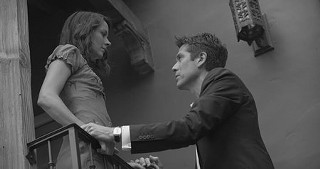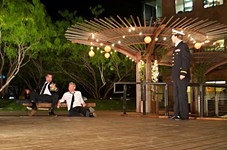Party All the Time
'Much Ado' and much fun with Whedon, Acker, and Denisof
By Robert Faires, 1:30PM, Fri. Jun. 21, 2013
Old friends at a party. That's the feel Joss Whedon was after in his micro-budget film version of William Shakespeare's Much Ado About Nothing, the play Whedon calls "the grandpappy of all romantic comedies." And to that end, he shot the movie in his own home, with pals he'd made on Angel, Firefly, and The Avengers.
The result is a refreshingly intimate and contemporary take on the 415-year-old comedy, with all the action taking place in the rooms and yard of a Southern California manse and wine flowing freely in virtually every scene.
Which is fitting, since the concept originated with a party: Whedon and his wife, producer Kai Cole, would gather friends at their home to drink wine and read Shakespeare plays aloud. When they tackled Much Ado, Whedon paired Amy Acker and Alexis Denisof, from his Buffy the Vampire Slayer spin-off Angel, as Beatrice and Benedick, longtime combatants in a "merry war of wits" until they're tricked into falling in love with each other. He was so struck by their handling of and chemistry in the roles that it made him want to commit those performances to film, though it took years – and prodding from Cole, who was willing to sacrifice a vacation to Venice – to make time to do it.
When the film premiered at South by Southwest in March, Whedon brought the party to Austin. A roundtable interview with the writer-director, Acker, and Denisof revealed the fun they have not just working together but being around one another and the reasons so much affection and intimacy shows up onscreen in their Much Ado About Nothing. Here are edited excerpts from that interview.
Austin Chronicle: Going back to that original reading: Joss has said that he really wanted to put your two performances on film. Do you have any specific memories of reading Benedick and Beatrice for the first time?
Alexis Denisof: Whenever I act with Amy, all I can remember is her. I have no recollection of that reading. I didn't even know that it was in [Joss'] mind to do this, honestly. [To Amy] Did you? He hadn't mentioned it to me, but when he said it, he said it as a matter of fact, so I thought, "Oh, this is a thing. I should have known."
Amy Acker: All of those readings – [To Joss] We used to do those readings at your old house, and it had a magical quality, as this one does. There was something about sitting in his backyard that was beautiful, drinking wine, reading Shakespeare, and anything with Alexis, all the stuff we've done has kind of accumulated to this point.
Joss Whedon: I just remember the wine.
AC: How many of those empty bottles that we see were consumed on set?
Whedon: Um, um, none. No, the actual party scene, we said, "We're gonna throw a party at our house and film it," and one of the line producers said, "Everybody says that." "No, no, we're going to." We shot all the big wides with a bunch of friends who were all actually drinking – none of the actors were – and gradually we winnowed it down to the smaller bits and sent the drunker friends to the front of the house, where they would not cause trouble.
Denisof: We had to keep them quiet while we were shooting.
Whedon: When we did the kitchen scene, there was a clearly marked area – you can't see it on film, but on the day – "These are the drinks that are watered that you can drink from. These are actual leftovers."
Denisof: Joss spoke earlier [about how] there are some constructs in the play that, if looked at too closely, don't hold up, so I think the drink in the hand was a sleight-of-hand to move us quickly and easily through some things that, like I say, you can't look at too closely.
Whedon: Also there is so much lying and deception and just game-playing – there's some pointless game-playing. They're these very privileged people in this very sort of decadent space, so we thought: Kennedys. We had a little sort of Kennedy compound vibe in our heads, sort of the suits and the lovely dresses and there might have been some drinking.
AC: Were there any moments for the two of you during the filming when you felt breakthroughs with your characters – "Now I really get Beatrice or Benedick"? And if so, did Joss play any part in that?
Denisof: He definitely did.
Acker: The benefit that we have all had – I mean, even back to Angel, like when we made Illyria we went over to Joss' house and the three of us worked into the night, and he turned on blue lights and did all this … We just have so much fun collaborating together. When we knew this was happening, we started out by just reading the parts together, and, I don't know, something magical happens when I'm with them. It felt like once we were reading it, even though I don't know that I ever felt like I totally got the character, sitting and reading the words, it was like we read it and then we were like, "Let's do this."
Denisof: You find levels and gears, don't you, as you go through a play and through the evolution of a character. I think that's where Joss is so incredible: He finds the next deeper level and then he also finds the next funniest piece, and he seems to do those things in lock step. And I love that personally. That's very much my taste. But I think there were key moments. I remember – it's funny, your partners can often unlock what you're looking for, and that's why I love working with these two; they are constantly showing me what to do.
Whedon: That makes me sound terrible.
Denisof: No, no. I mean it in a good way.
Whedon: "Let me show you how this kiss works." [laughter]
Denisof: But I remember the incredible scene with Beatrice, "O, that I were a man," she found a gear that for me was like, "Oh, wow. Okay, this is really happening now. We really are these people. We're really telling this story." Joss has a way of getting you there and then just letting you fly. I think that's what I love about working with him. And he's sort of with you. He's with you the whole way, and yet you feel free. It's a hard thing to describe, and I should stop talking about it, because it sounds a little pretentious now.
Acker: Everybody in that movie just trusts [Joss] so much. He has such great taste, and you see everything that he does – I mean, if I'm putting together stuff, and I'm like, "Oh, what are my favorite things? Oh, Joss wrote and directed that. Joss wrote and directed that." So you just know he's not going to let you look bad. And I think everybody in the whole movie felt that. We all want to impress him, and we know that he's not going to let us get away with something that he doesn't like.
Whedon: My only policy about directing is: Just create a safe space. Make sure they know what they're doing. Make sure you're all on the same page. And then create a space that's safe enough for them to perhaps do insane calisthenics. That's all Alexis. That was one of my favorite things. 'Cause if you just go, "Okay, do exactly this, do exactly that," what you get is exactly this and exactly that. And the whole point of this was, there is an energy, a theatrical present-ness, that these people create together, that if we do this and do it quickly enough, we will capture some of that energy without having to sort of, "Okay, now it's your close-up. Now it's your close-up." And you do have to get out of the way – sometimes literally, like get the cameras as far back as possible and let them think they're just on a stage space. "O, that I were a man" – the bulk of that was all one take. It's a couple of different cameras going, but it's not all chopped up. We just gave them the room. And you need to have the people you can do that to, but for the director, a big part of the job is just stepping back and shutting the hell up.
Denisof: He has a way of coming in – maybe you've rehearsed it and done one take, and it's sort of there, it's okay – and he'll say, "Just one small thing. I want you to think about … whatever, x, y, and z." And then you try it, and something really magical happens, and the air is just a little bit electric after the take, and then Joss walks onto the set after the take, and you just see in his face and his eyes that no words need to occur. You know –
Whedon: You're fired. [laughter]
Denisof: And then he says, "Moving on!"
A note to readers: Bold and uncensored, The Austin Chronicle has been Austin’s independent news source for over 40 years, expressing the community’s political and environmental concerns and supporting its active cultural scene. Now more than ever, we need your support to continue supplying Austin with independent, free press. If real news is important to you, please consider making a donation of $5, $10 or whatever you can afford, to help keep our journalism on stands.
Spike Gillespie, May 2, 2014
Dan Solomon, July 19, 2013
Sept. 24, 2021
Sept. 17, 2021
Much Ado About Nothing, Joss Whedon, Amy Acker, Alexis Denisof, Angel











